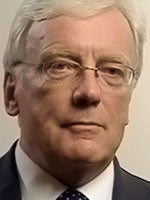“I took the view that what we ought to be talking about and thinking about was universal suffrage,” stated Michael Young in a lecture at HLS titled, “The Secret Talks That Led to the Fall of Apartheid.” As a British businessman in the 1980s, Young initiated and led unprecedented talks between the African National Congress and the South African government that led to the end of apartheid in South Africa.
Young, who facilitated many important talks including several between Britain and Northern Ireland, and in Spain after the fall of Franco, spoke at HLS on March 6, at an event sponsored by the Harvard Negotiation & Mediation Clinical Program with the Program on Negotiation. The event was also co-sponsored by the Harvard Mediation Program, the Harvard Negotiation Law Review, and Harvard Negotiators.
In the 1980′s, Young was head of communications for Consolidated Gold Fields, a British mining company with significant assets in South Africa. At the request of African National Congress President Oliver Tambo, Young initiated a series of covert negotiations between representatives of the exiled ANC and powerful Afrikaner elite. The negotiations, which took place between 1986 and 1990, led to the end of the apartheid system and the release of anti-apartheid activist Nelson Mandela.
At a time when British Prime Minister Margaret Thatcher and U.S. President Ronald Reagan were in power and encouraging South Africa to move away from apartheid, the business world was conflicted on ways in which they could address the situation themselves. Porous borders and increasing violence within the townships were causing unrest and agitation towards the South African government was growing. Which was a problem for private business. Many saw an answer in building up a black middle class and black entrepreneurs. Young, however, took it much further.
Recalling his first meeting with Tambo, Young said he asked the ANC leader, “‘What can a British Company do to make a difference in South Africa?’” After a long reflection, Tambo replied, “‘I want you to help me build a bridge to Pretoria, because when the signals come, I don’t think I’ll recognize them. We need to have a channel of communication which is not microphone or amplified through the media but is as direct and personal as possible.’”
Young then spent months trying to determine which member of the Afrikaans elite to begin negotiations with. He said he was looking for a person who was intellectually flexible enough to participate in the negotiations but influential enough to sway the opinions of others. Eventually he focused on professor, William [Willie] Esterhuyse, who studies and lectured on political philosophy at the University of Stellenbosch; the intellectual powerhouse of Afrikaans.
“Here we had two sets of people who didn’t like one another, and they actually believed each other to be pretty much evil. And so the role of the facilitator in this circumstance was to be extraordinarily direct. To be very directional, to say ‘Ok, what do you think about that. Ok, you’ve had your say, now what’s your response to that’, to orchestrate in a way which a facilitator in the normal circumstances would not do. Because the trick, it seems to me, with facilitation, is to encourage the owners, to pick up the proposition and run with it. It’s not my agenda; it’s not my problem. It’s theirs and it’s their issue to pick it up.”
Early in his career, Young served at the Conservative Research Department as an advisor to British Foreign Secretary Sir Alec Douglas-Home where he dealt with matters relating to Africa, Cyprus and the Middle East. He later served as an economic advisor to Prime Minister Edward Heath and was involved in early negotiations between the British government and Irish republicans.
Young is a specialist in conflict resolution and strategic evaluation. He is currently Chairman of Michael Young Associates, Ltd., which focuses on management counseling, conflict resolution, market positioning and management, regulatory practices, mergers and acquisitions, and bringing new ventures to market.
Young’s story and the final days of apartheid in South Africa is the subject of the 2009 British Film Endgame, based on the book The Fall of Apartheid by Robert Harvey.
